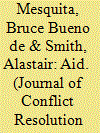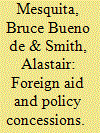| Srl | Item |
| 1 |
ID:
119961


|
|
|
|
|
| Publication |
2013.
|
| Summary/Abstract |
Temporary membership on the United Nations Security Council (UNSC) has pernicious effects on the political and economic development of nations, particularly in nondemocracies. The leaders of rich democratic states often trade resources for the salient policy favors that UNSC members can deliver. This provides the leaders of temporary UNSC members with access to "easy money" resources. Such resources have deleterious consequences, particularly in nondemocracies, because they provide leaders with the means to pay off their coalition of supporters without reliance on tax revenues. While foreign aid is an important form of easy money bribe, it is but one of many. Empirical tests show loans are a substitute means for bribing UNSC members.
|
|
|
|
|
|
|
|
|
|
|
|
|
|
|
|
| 2 |
ID:
076882


|
|
|
|
|
| Publication |
2007.
|
| Summary/Abstract |
We model foreign-aid-for-policy deals, assuming that leaders want to maximize their time in office. Their actions are shaped by two political institutions, their selectorate and winning coalition. Leaders who depend on a large coalition, a relatively small selectorate, and who extract valuable policy concessions from prospective recipients are likely to give aid. Prospective recipients are likely to get aid if they have few resources, depend on a small coalition and a large selectorate, and the policy concession sought by the donor is not too politically costly. The amount of aid received, if any, increases as the recipient leader's coalition increases, the selectorate decreases, the issue's salience increases, and the domestic resources increase. The theory explains why many Third World people hate the United States and want to live there. Empirical tests using the U.S. Agency for International Development data for the post-World War II years support the model's predictions.
|
|
|
|
|
|
|
|
|
|
|
|
|
|
|
|